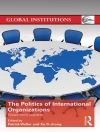Legitimacy is central for the capacity of global governance institutions to address problems such as climate change, trade protectionism, and human rights abuses. However, despite legitimacy’s importance for global governance, its workings remain poorly understood. That is the core concern of this volume: to develop an agenda for systematic and comparative research on legitimacy in global governance. In complementary fashion, the chapters address different aspects ofthe overarching question: whether, why, how, and with what consequences global governance institutions gain, sustain, and lose legitimacy?The volume makes four specific contributions. First, it argues for a sociological approach to legitimacy, centered on perceptions of legitimate global governance among affected audiences. Second, it moves beyond the traditional focus on states as the principal audience for legitimacy in global governance and considers a full spectrum of actors from governments to citizens. Third, it advocates a comparative approach to the study of legitimacy in global governance, and suggests strategies forcomparison across institutions, issue areas, countries, societal groups, and time. Fourth, the volume offers the most comprehensive treatment so far of the sociological legitimacy of global governance, covering three broad analytical themes: (1) sources of legitimacy, (2) processes of legitimation anddelegitimation, and (3) consequences of legitimacy.
Karin Backstrand & Jan Aart Scholte
Legitimacy in Global Governance [PDF ebook]
Sources, Processes, and Consequences
Legitimacy in Global Governance [PDF ebook]
Sources, Processes, and Consequences
Beli ebook ini dan dapatkan 1 lagi GRATIS!
Bahasa Inggris ● Format PDF ● Halaman 264 ● ISBN 9780192561596 ● Editor Karin Backstrand & Jan Aart Scholte ● Penerbit OUP Oxford ● Diterbitkan 2018 ● Diunduh 3 kali ● Mata uang EUR ● ID 8103303 ● Perlindungan salinan Adobe DRM
Membutuhkan pembaca ebook yang mampu DRM












